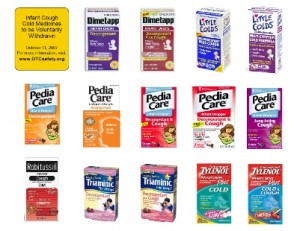
Over-the-counter medicines (OTC meds) don’t cure colds in kids. The FDA has spoken, and said that the kinds of kid-targeted medicines photographed on the right aren’t only useless — they can be dangerous.
The offending incredients are dextromethorphan, used in cough suppressants; pseudoephedrine and phenylephrine, used in decongestants; guaifenesin, an expectorant; and, brompheniramine, chlorpheniramine maleate, or diphenhydramine, used in OTC meds labelled as antihistamines.
If ever there was a time for a parent to get into label-reading, it’s now. The good news is that more of us are reading labels, according to the Hartman Group, the food and wellness research group. But Hartman’s research is into reading food labels, and not necessarily reading medicine labels.
Hartman says that, “the depth of interrogation increases as consumers become more active in health and wellness lifestyles.”
The challenge is that labels for OTC meds can be tough to read. In fact, basic medical instructions are hard for many adults. “Even those who are most proficient at using text and numbers may be compromised in the understanding of health care information when they are challenged by sickness and feelings of vulnerability,” according to the Joint Commission in their report, What Did the Doctor Say? Improving Health Literacy to Protect Patient Safety. When your kid is sick, you as a parent can indeed feel vulnerable.
When your kid is sick, you as a parent can indeed feel vulnerable.
The savvy consumer goods retailer Target has won awards for its prescription drug label and ergonomically sound packaging. OTC products that are in front of the pharmacy counter don’t require the intervention of the pharmacist for dispensing. However, with OTCs, the consumer is on her own. OTC labels should be as consumer-friendly and helpful as Target’s Rx labels.
In the meantime, as a mother of a child who will inevitably be getting a cold this season, I like this smart advice from Wegmans, the family-owned grocery chain…
Hugs and Other Non-drug Support
You can help your help your children feel better in other ways, too — especially making sure they feel loved and cared as only you can:
1. Give them a daily multi-vitamin to support their immune system.
2. Have him or her drink plenty of fluids. This helps to thin mucous, making it easier to expel.
3. Be careful to avoid giving caffeine-containing drinks during a cold or the flu, as the diuretic effect of these can counteract the benefits of fluids.
4. Use a moisturizing nasal spray to ease dry or itchy nasal passages.
5. Remember good old Vick’s Vapo-Rub? Rub a little onto the child’s chest and let the vapors loosen up the congestion. Soon, your child may be breathing easier, and without so much as one teaspoon of medication introduced into their system.
Health Populi’s Hot Points: Slow down and ready the label. As The Hartman Group recognizes, consumers’ interest in label-reading increases with their level of engagement in healthy living. When it comes to caring for kids, there are no good excuses for parents not getting engaged.




 Interviewed live on BNN Bloomberg (Canada) on the market for GLP-1 drugs for weight loss and their impact on both the health care system and consumer goods and services -- notably, food, nutrition, retail health, gyms, and other sectors.
Interviewed live on BNN Bloomberg (Canada) on the market for GLP-1 drugs for weight loss and their impact on both the health care system and consumer goods and services -- notably, food, nutrition, retail health, gyms, and other sectors. Thank you, Feedspot, for
Thank you, Feedspot, for  As you may know, I have been splitting work- and living-time between the U.S. and the E.U., most recently living in and working from Brussels. In the month of September 2024, I'll be splitting time between London and other parts of the U.K., and Italy where I'll be working with clients on consumer health, self-care and home care focused on food-as-medicine, digital health, business and scenario planning for the future...
As you may know, I have been splitting work- and living-time between the U.S. and the E.U., most recently living in and working from Brussels. In the month of September 2024, I'll be splitting time between London and other parts of the U.K., and Italy where I'll be working with clients on consumer health, self-care and home care focused on food-as-medicine, digital health, business and scenario planning for the future...